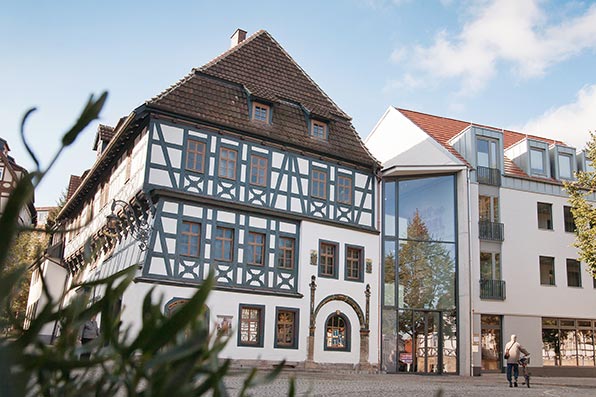Martin Luther: 'Barking archvillain' or latter-day prophet?
Catholics and Protestants, by the nature of the case, have always had an uneasy relationship. This year marks the 500th anniversary of the start of the Reformation, on October 31, when Martin Luther nailed his 95 Theses attacking Church corruption on the door of Wittenberg's Castle Church (allegedly – scholarly opinions are divided).
Today is the anniversary of a ferocious attack on those Reformers by Pope Pius X. In his encyclical Editae Saepe, about the Catholic reformer St Charles Borromeo (1538-1584), published in 1910, he blames them for all the evils of the modern world. He said their purpose was 'not the restoration, but the effacement and destruction of faith and morals'.
Of the Reformation he says: 'In those days passions ran riot and knowledge of the truth was almost completely twisted and confused.' The Reformers 'were not concerned with correcting morals, but only with denying dogmas. Thus they increased the chaos. They dropped the reins of law, and unbridled licentiousness ran wild. They despised the authoritative guidance of the Church and pandered to the whims of the dissolute princes and people...They called this rebellious riot and perversion of faith and morals a reformation, and themselves reformers. In reality, they were corrupters.'

However, this hostility toward the Reformers – fully reciprocated – while common enough among Catholics, isn't the whole picture of how they have been seen through the last five centures, and certainly isn't how they're officially seen now.
A fascinating exhibition at the Luther House in Eisenach, where Luther stayed as a boy (he later found refuge at the Wartburg Castle near the town), unpicks the uncertain relationship Catholics have with the first Reformer. As well as various Luther artefacts and documents, visitors can see a separate display entitled Heretic, Schismatic, Teacher of the Faith: The Catholic View of Luther. He came to define himself in opposition to the Roman Church and the papacy – but how did Catholics see him? It's mixed.
For one scholar writing in 1525, Ulrich Zasius, he was 'the basest of all bipeds'. Abraham Nagel, writing in 1589, wrote: 'Examine Luther therefore from back and front and on every side from bottom and top: then, he is just a pile of filth and his mouth is full of dreck; and the more one stirs up his dreck, the more he stinks.' After that he gets a little too crude to quote. For Johannes Weislinger in 1722 Luther was 'the arch-violator rake, the barking archvillain blaspheming God and mankind, the general heretic and apostle of Satan wantonly teaching errors', 'on a first name basis with the devil incarnate'.
And Catholic historian Heinrich Denifle wrote in 1906: 'As far as his cynicism, base language and speech are concerned, Luther did not even rise above any common stable boy, swineherd and street sweeper of his day.'
That's not the whole story, of course. In recent years Catholic scholars have come to a more generous appreciation of Luther. Johannes Hessen wrote in 1947 of him: 'Luther ranks among the Old Testament prophets. Like them, he is also a champion of God filled by holy zeal. Like them, he also fights for the ideal of high and pure veneration of God, for worship of God "in spirit and in truth". Like them, he also sees his mission to be to purify and cleanse religion, to reform it.' And Preacher to the Papal Household Raniero Cantalamessa said in 2016: 'Luther deserves the credit for bringing this truth back when its meaning had been lost over the centuries, at least in Christian preaching, and it is this above all for which Christianity is indebted to the Reformation.'
One of the marks of Luther's rehabilitation in Catholic eyes is a hugely significant document that was agreed between the Catholic Church and the Lutheran World Federation in 1999. The Joint Declaration on the Doctrine of Justification goes the root of the Reformation, whose central question was, 'How can someone be saved?' After decades of conversations, Catholics and Lutherans agreed that they fundamentally believed the same thing and that their mutual condemnations no longer applied.
It's in the wake of this that Pope Francis went to Sweden last October for the beginning of the Reformation celebrations, a move that infuriated traditionalists who were still of Pius X's mind. He said then that he wanted commemorations to take part in a spirit of humility on both sides.
In a statement reproduced at the Eisenach exhibition Francis said: 'I don't believe Martin Luther's intentions were wrong. He was a reformer. Perhaps some methods were not appropriate but we see that the Church was not exactly an exemplary model at that time. There was corruption, worldliness, attachment to money and power. That is why he protested. He was intelligent and took a step forward and explained why he did this. Today, we Protestants and Catholics are in agreement on the doctrine of justification. On this very important point, he did not err.'
The Catholic Church has come a long way from the crude denunciations of Luther's contempories. So have Protestants: Luther's view that the Pope, or the Papacy, is the Antichrist of the New Testament is not held today outside independent fundamentalist congregations. Whether any kind of formal reunion might come to pass – and what that might look like – is a different question. But it's fascinating to look back at what has changed, and what might be possible in the future.
'Heretic, Schismatic, Teacher of the Faith: The Catholic View of Luther' is at the Lutherhaus in Eisenach, Thuringia until November 5.











